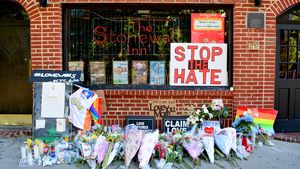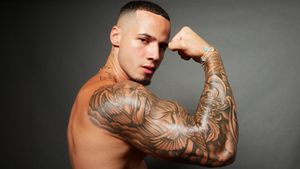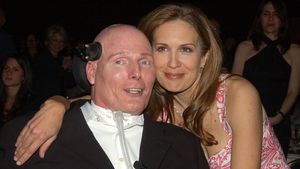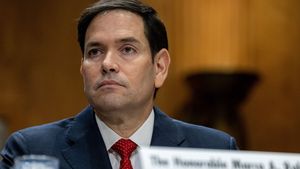Comments of celebration, and some inevitable criticism, began to flow late Friday night and into the Pride weekend worldwide as New York, the birthplace of the modern gay rights movement, became the sixth and most populous state, in addition to Washington, D.C., to give same-sex couples the right to civil marriages through a historic vote in the Republican-led state senate.
"New York has finally torn down the barrier that has prevented same-sex couples from exercising the freedom to marry and from receiving the fundamental protections that so many couples and families take for granted," said Governor Andrew Cuomo. "With the world watching, the legislature, by a bipartisan vote, has said that all New Yorkers are equal under the law. With this vote, marriage equality will become a reality in our state, delivering long overdue fairness and legal security to thousands of New Yorkers."
Cuomo signed the bill into law shortly before midnight. The law will take effect on July 24 with religious exemption language that helped secure the votes of two more Republicans, Stephen Saland and Mark Gristanti, during the senate floor debate. In all, four Republicans supported the bill, which passed the senate by a vote of 33 to 29 after winning approval in the Democratic-controlled assembly for the fourth time since 2007.
Although the state senate Republican conference made history with the vote, it issued no official statement. Majority leader Dean Skelos announced Friday that an up-or-down vote would be held after many hours of deliberation among his 32 members.
“As I have said many times, this is a very difficult issue and it will be a vote of conscience for every member of the Senate,” he said.
The Log Cabin Republicans, part of the bipartisan New Yorkers United for Marriage coalition of five LGBT advocacy organizations that worked with Cuomo to pass the bill, issued a statement that marked the historic occasion.
“This achievement marks the first time a Republican led chamber has enacted marriage equality, we look forward building on our successes in states across the country,” said R. Clarke Cooper, the group’s executive director. “Log Cabin will stand with the allies who stood with us today as part of a stronger, more inclusive Republican Party.”
The five organizations in the coalition, which raised $2 million in recent months, more than half from Republicans and affiliated donors, brought an unprecedented level of coordination and resources for communications, fieldwork and lobbying in the state campaign. In addition to Log Cabin, other partners included the Human Rights Campaign, Freedom To Marry, Marriage Equality New York, and the Empire State Pride Agenda.
New York City mayor Michael Bloomberg, an independent and major contributor to state senate Republicans, lobbied some members of the conference and contributed to the fund-raising. He also delivered a speech on marriage equality that positioned the issue as the latest in a series of freedom movements incubated in New York, including women’s rights, workers’ right, the abolition movement, and minority civil rights.
“In recent weeks, I have had many conversations with our state senators,” said Mayor Bloomberg in a statement. “I emphasized that not only is marriage equality consistent with bedrock American principles, but it is also consistent with bedrock Republican Party principles of liberty and freedom – and the Republicans who stood up today for those principles will long be remembered for their courage, foresight, and wisdom. In fact, 10 or 20 or 30 years from now, I believe they will look back at this vote as one of their finest, proudest moments.”
As Gov. Cuomo noted in his remarks after the vote, the four Republicans provided their support at greater political risk than the Democratic senators, all of whom supported the bill except the avowedly antigay Ruben Diaz. Sr. The Conservative Party of New York State, which threatened not to offer its influential endorsement to any Republican lawmaker who supported the bill, issued a statement calling the vote a “disaster.”
“We question how marriage will be defined in the future. Moreover, we question what will be the effect on society,” said the Conservative Party. “Passage of this legislation, in our view, will cause irreversible damage to our economy, educational system and the family.”
The New York State Catholic Conference, which represents the bishops including Archbishop Timothy Dolan who strongly opposed the bill, issued a statement before the vote on Friday that reiterated no kind of religious exemptions would make the bill acceptable.
“Marriage has always been, is now, and always will be the union of one man and one woman in a lifelong, life-giving union,” said the statement. “Government does not have the authority to change this most basic of truths."
The vote in the senate held special meaning for the chamber’s first and only openly gay member, Thomas K. Duane of Manhattan, who has carried the bill for years. He spoke during the floor vote about coming out to his Catholic parents, the gay rights journey since the 1970s, and his relationship with his partner, Louis Webre.
“It is true that today holds enormous historical significance and it must be proudly celebrated,” said Duane in a statement after the vote. “The paradoxical truth is that what already exists and will not change, but for true legal recognition, is the commitment and love that is already the reality in so many of New York’s families.”
Read more on Advocate.com.






























































































 Cindy Ord/Getty Images
Cindy Ord/Getty Images

























